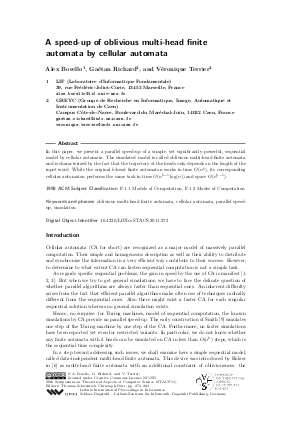A speed-up of oblivious multi-head finite automata by cellular automata
Authors Alex Borelllo, Gaetan Richard, Veronique Terrier
-
Part of:
Volume:
28th International Symposium on Theoretical Aspects of Computer Science (STACS 2011)
Part of: Series: Leibniz International Proceedings in Informatics (LIPIcs)
Part of: Conference: Symposium on Theoretical Aspects of Computer Science (STACS) - License:
 Creative Commons Attribution-NonCommercial-NoDerivs 3.0 Unported license
Creative Commons Attribution-NonCommercial-NoDerivs 3.0 Unported license
- Publication Date: 2011-03-11
File

PDF
LIPIcs.STACS.2011.273.pdf
- Filesize: 1.2 MB
- 11 pages
Document Identifiers
Subject Classification
Keywords
- oblivious multi-head finite automata
- cellular automata
- parallel speed-up
- simulation
Metrics
- Access Statistics
-
Total Accesses (updated on a weekly basis)
0Document
0Metadata
Abstract
In this paper, we present a parallel speed-up of a simple, yet significantly powerful, sequential model by cellular automata. The simulated model is called oblivious multi-head finite automata and is characterized by the fact that the trajectory of the heads only depends on the length of the input word. While the original $k$-head finite automaton works in time $O(n^k)$, its corresponding cellular automaton performs the same task in time $O(n^(k-1)log(n))$ and space $O(n^(k - 1))$.
Cite As Get BibTex
Alex Borelllo, Gaetan Richard, and Veronique Terrier. A speed-up of oblivious multi-head finite automata by cellular automata. In 28th International Symposium on Theoretical Aspects of Computer Science (STACS 2011). Leibniz International Proceedings in Informatics (LIPIcs), Volume 9, pp. 273-283, Schloss Dagstuhl – Leibniz-Zentrum für Informatik (2011)
https://doi.org/10.4230/LIPIcs.STACS.2011.273
BibTex
@InProceedings{borelllo_et_al:LIPIcs.STACS.2011.273,
author = {Borelllo, Alex and Richard, Gaetan and Terrier, Veronique},
title = {{A speed-up of oblivious multi-head finite automata by cellular automata}},
booktitle = {28th International Symposium on Theoretical Aspects of Computer Science (STACS 2011)},
pages = {273--283},
series = {Leibniz International Proceedings in Informatics (LIPIcs)},
ISBN = {978-3-939897-25-5},
ISSN = {1868-8969},
year = {2011},
volume = {9},
editor = {Schwentick, Thomas and D\"{u}rr, Christoph},
publisher = {Schloss Dagstuhl -- Leibniz-Zentrum f{\"u}r Informatik},
address = {Dagstuhl, Germany},
URL = {https://drops.dagstuhl.de/entities/document/10.4230/LIPIcs.STACS.2011.273},
URN = {urn:nbn:de:0030-drops-30172},
doi = {10.4230/LIPIcs.STACS.2011.273},
annote = {Keywords: oblivious multi-head finite automata, cellular automata, parallel speed-up, simulation}
}
